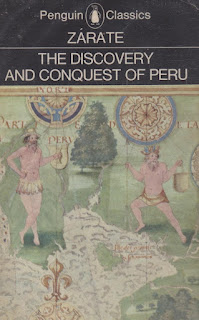 Alexander Hamilton by Ron Chernow
Alexander Hamilton by Ron ChernowMy rating: 4 of 5 stars
This completes the reading of all three of Ron Chernow's political biographies and I will surely miss his writing style - more of interesting narrative story-telling than the dry stating of facts. That said, reading this one took me three months - more because of the tardiness I developed towards reading than anything - I am still plodding through another biography of Pitt the Younger.
I came across Alexander Hamilton from reading Gore Vidal's 'Burr' about 13-14 years back. I've read about him a bit at a time and more as a side actor in the lives of Washington, Adams and Jefferson. So, I have to admit that I started this book with a lot of misgivings.
But I was glad that I took it up. I have read about Hamilton's setting up of the Bank of America and the financial institutions that built up the country, but not in this details. The story of a West Indian orphan making it into the bank notes of America is not just a remarkable story to read, it is inspiring as well.
Chernow goes into a lot of details about the early life of Hamilton in the slavery-ridden islands of the Caribbean and establishes a lot of context for the actions of Hamilton in the later parts of his public life. That also gives some context to some of his actions which seem inexplicable and sometimes, utterly self-destructing.
Hamilton comes out as a flawed genius - made his mark as the guy who created the Federal government as we know it today and then had to recede from politics with the rise of Jefferson and his party in the later days. His achievements in ensuring the finances of his country and in creating the institutions that sustain it are testimonial to his genius but the fact that politics never gave him another opportunity to influence the country's finances or anything is also sad.
He is also flawed because of the numerous mis-steps he make in his political career and which ultimately puts him outside the power corridor with the passing of George Washington. A lot of it can be attributed to his early days and the difficult path he has to take to reach the pinnacle of success. But that only is part of the story and a lot more can be said about the fatal flaws in the man's character itself which Chernow explores and at times, glosses over.
A biographer's job is difficult and he has to ensure that he is true to his subject. Chernow ,at times, gets enamored by his subject and starts passing judgement on his political opponents as if they were his own. Especially the rivalry between Hamilton and Jefferson need to be looked at in the context of the days and think both had the right intentions but developed different ways to attain it. Calling Jefferson's politics as Mobocracy only discredits the author and disservices the subject he has taken to defend.
The politics of the day - with Adams Vs Hamilton or Jefferson Vs Hamilton - was played dirty even by any other standards. Libelous writings were the norms of the day and the caricatures and the character assassinations through surrogate writers were shocking to modern sensibilities used to the fake news forwards in Whatsapp.
The Maria Reynolds affair is one at hand. Hamilton's affair with this lady is bad enough but the way it was hushed up - through black mails and gentlemen's honor etc only makes it worse. When there were anonymous writing (instigated by Jefferson, apparently) starts appearing in press, Hamilton responds by writing a salacious pamphlet of tens of pages accepting the same and putting every detail in paper. I couldn't comprehend the reason why he did it and apparently Chernow tries to find reasons which are too complex anyway.
"I heal all wounds but those which love hath made."- Hamilton
Eliza Hamilton and her relationship with Alexander comes out as more complex. He keeps putting her through impossible situations - like the Maria Reynolds affair or the later political turmoils in New York - and we do not have many documents or letters expressing how she felt about those and but going by her fierce loyalty to Hamilton's memory after his death, think she forgave him in most instances or her love was such that she was able see past his faults.
Finally, the Burr episode - which ends with the killing of Hamilton - is although understandable, is inexplicable. The whole episode escalates too fast and it is incredible that there is no one who try to deescalate the same thing and Hamilton, father of 8 children, is killed in the ensuing duel for some trifling reason - an apology would've been suffice. The gentlemen's code of honor and conduct of those days in at times irritatingly idiotic (although I say it with the full benefit of hindsight).
Over all, it is a very long book and I enjoyed it as most of the characters and the events of the period were of immense interest to me.

